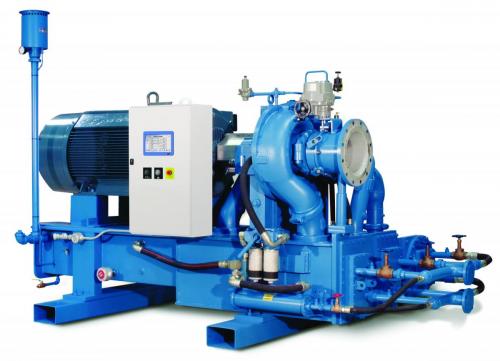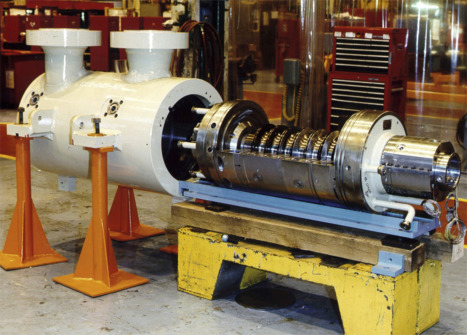In this article from Linquip, we want to explain different types of centrifugal compressor and talk about them one by one. By the end of the article, you will know how many types of centrifugal compressors exist on the market, what they do and what their differences are. Continue reading…
Different types of centrifugal compressor
There are different types of centrifugal compressor designed for specific purposes based on the desired applications. The most popular ones are single-stage and multi-stage centrifugal compressor. Below, we’ll explain all about these compressors. It’s good to know that they follow the same principle, but they are different in their construction and how they get the job done.
-
Single Stage Compressor
Single-stage compressors are among the popular types of centrifugal compressors available on the market. This type has a single impeller for directing the air or other gases for its specific purpose. The single-stage compressor also contains a diffuser and connected guide vanes. IT can provide up to a three to one compression ratio because of its impeller peripheral speed as well as blade geometry. Plus, these types contain flow capacities ranging from 1000 cfm to 300 thousand cfm.
This centrifugal compressor type has different designs including overhung single-stage compressor and integrally geared single-stage compressors.
-
Overhung Single Stage Centrifugal Compressor
One of the most useful types of centrifugal compressors for low pressure and high volume application is the overhung single-stage compressor. The impeller in this type is placed at the non-drive side of the shaft. They have higher efficiency and a wider range of operation due to their axial flow suction nozzle. The gas flow that this compressor can handle is up to 60,000 m³/hr and up to a 3.5 pressure ratio.
-
Integrally Geared Single Stage Centrifugal Compressor
This type, as the name suggests, contains a single-stage compressor but has overhung semi-open impeller. The high-speed shaft of the gearbox hosts the impeller. A maximum of 300 thousand m³/hr is the amount of gas flow that this compressor type can handle. And the pressure ratio that it supports is up to 3.5. It can also achieve a discharge pressure of up to 50 bar.
Watch Video about Types of centrifugal compressor
-
Multi-Stage Compressor
Multi-stage compressors are among different types of centrifugal compressors. As the name suggests, this compressor has been designed to pass the gas through multiple stages for diverse purposes. Multi-stage compressors are used when a single-stage compressor can’t keep up with the desired pressure requirements. This is because a single-stage compressor, as mentioned above, has only one impeller.
Unlike this centrifugal compressor type, multi-stage compressors contain several impellers on the rotor. Each impeller diffuser leaves the discharge to enter the next impeller. Multi-stage compressors have different types including multi-stage centrifugal compressor with horizontally split casing, multi-stage centrifugal compressor with vertically split casing, multi-stage centrifugal compressor with bell casing, pipeline multi-stage compressors, and integrally geared multi-stage compressors.
-
Multi-Stage Centrifugal Compressor with Horizontally Split Casing
Among different types of centrifugal compressors, this one is popular as well. These compressors are mainly used for applications with lesser than 60 bars of gas operating pressure. Horizontally split casing compressors contains two halves of a cylindrical case. Their centerline keeps them connected by bolting.
This compressor type is not suitable for very high pressure due to the sealing and bolting limitations at the split. Almost all the piping connections of this compressor type has been placed at the lower half of the compressor. But that is not the case for the main process in and out connection since it is placed at the upper half of the system (although some designs might differ, in most cases, it is placed at the upper half.)
-
Multi-Stage Centrifugal Compressor with Vertically Split Casing
This centrifugal compressor with vertically split casing also looks like a cylinder and is also called a barrel. Unlike horizontally split casing compressors, a multi-stage centrifugal compressor with vertically split casing is among the types of centrifugal compressors that are perfect for applications with higher pressures. These compressors have one-piece construction and also seals at all ends of the barrel and are perfect for high pressures up to 680 bars.
-
Multi-Stage Centrifugal Compressor with Bell Casing
A multi-stage centrifugal compressor with bell casing is also on the list of different types of centrifugal compressors. They are named after the shape of their case that looks like a bell. This case uses shear rings for closing instead of using bolts. They are suitable for high-pressures.
-
Pipeline Multi-Stage Compressors
Pipeline compressors, just like the precious centrifugal compressor type have bell-shaped casings but contain a single vertical end cover. Their delivery nozzles and side suction are placed opposite of each other which make the design suitable for installation on gas pipelines. These compressor types can handle pressure up to 100 bars and are mainly suitable for natural gas transportation and similar purposes.
-
Integrally Geared Multi-Stage Compressors
The last item on our list is the multi-stage compressor that is integrally geared. They are used for high pressure and low flow or low pressure and high flow. Each pinion-shaft in these compressors can host up to two impellers. They have high efficiency due to their ability to inter-cool compression stages as well as their optimal impeller speed.
So, that was the most popular types of centrifugal compressors available on the market. Do you think they can live up to your expectations? Comment below and let us know what you think. If you have any questions, you can easily sign up on Linquip and one of our experts will be right with you.
Read More on Linquip
- How Does a Centrifugal Compressor Work?
- The Differences Between Axial Compressor & Centrifugal Compressor
- What is Hydrovane Compressors ? (Ultimate Guideline)
- The Most Comprehensive Guide to Know Piston Compressor
- Axial Flow Compressors 101: The Essential Overview
- Rotary Vane Compressors 101: The Essential Intro
- Difference Between Air-Cooled vs Water-Cooled Compressor
- The 7 Best Air Compressors of 2022
- The Essential Guide to the 4 Types of Air Compressors
- Types of Centrifugal Pumps: All Classification & Working Principles
- Everything You Need To Know About Different Types Of Compressor




